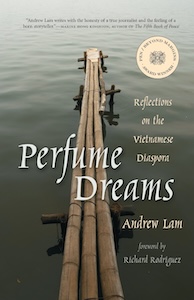kuniga.me > Books > Perfume Dreams
Perfume Dreams

Full title: Perfume Dreams, Reflections on the Vietnamese Diaspora, by Andrew Lam. The title of the book comes from the Perfume River in Hue, Vietnam where Lam spent part of his childhood. The dream is perhaps a reference to his memories and the longing for a place that no longer exists, the Vietnam of his youth.
This is a memoir by Lam, who fled Vietnam a few days before Saigon fell to the North. Lam’s father was a high rank military and they fled in an American military airplane when Lam was a child.
In this book Lam reflects on his identity as a Vietnamese, refugee and American. Some topics covered are: life and culture in Vietnam vs. the USA, difficulty adults have in adapting, and life in refugee camps.
Lam makes the interesting suggestion of the shift in culture from Confucian collectivism of Vietnam towards a more individualist and looking up to Western values:
While elderly Vietnamese leaders continue to emphasize the finer points of collective strength, citing memories of wars against invaders, the young of Vietnam have moved away from a parochial us-versus-them mentality. If Ho Chi Minh, the father of Vietnamese communism, once preached independence and freedom to his compatriots, today it’s the Viet Kieu, those like me and my family, persecuted by Ho’s followers and forced to escape overseas, who, upon return, exude freedom and independence.
and
As a Viet Kieu, I am often not just an individual but, to many, an icon against hopelessness, a character who took the high road and through whose life many can live vicariously. Familiarity and constant interactions over the last few years may have diminished the awe and glamour, but there is still an expectation here that a Viet Kieu, were he willing, could fulfill many an impoverished Vietnamese wish list.
I learned from this book that there were waves of refugees. Lam was one of the first, and as mentioned fled Vietnam with support from the US military, before the fall of Saigon. Subsequent waves fled after the Communists took power and did so by boat, trying to make into refugee camps and exposed to all sorts of perils.
As time passed, people started fleeing not only political prosecution but also economic hardships, and countries in the west started getting “compassion fatigue” and became a lot more selective in accepting refugees, so later waves were often stuck in refugee camps for months, awaiting their fate and the majority were sent back.
One passage I found particularly relevant to my trip:
If you travel along rural roads in my homeland, you will see rice fields full of old graves rising above the waterline. In the gardens of some houses, people are buried among patches of vegetables and bamboo groves where children play. Life and death coexist in close proximity in the Confucian cosmology—an intimate dance.
I saw several graves in rice fields (Figure 1) and in the Mekong Delta, graves in the backyard of houses.

Conclusion
I bought this book in Vietnam during my time there. It provides some interesting insights on a personal level, but I don’t feel like I learned too much about the general history of it.
Overall 4/5.